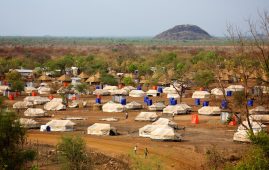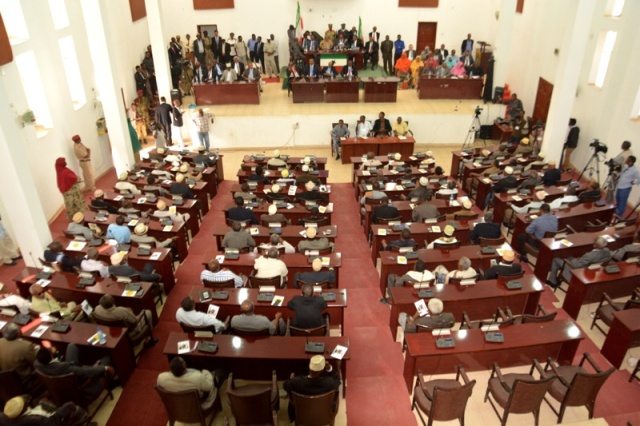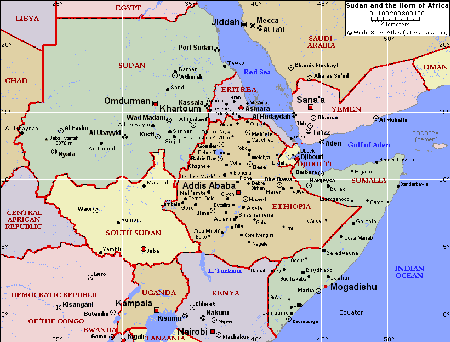[The following post is authored by Fetsum.]
If you are an Ethiopian, you probably believe there is yet unfound oil reserve somewhere which someday would come out and change our lives. We were told by many where the oil exists and why it was not found yet. Well, if you believe the U.S. embassy cables recently released, you are in for a disappointment.
A U.S. embassy cable dated the Feb 27, 2008, ‘Black Gold: Petroleum Resources in Ethiopia’ makes an assessment of Ethiopian petroleum exploration projects and future prospects based on interviews with Dr. Ketsela Tadesse, Petroleum Operations Department, Ministry of Mines and Energy and a U.S. petroleum expert, Dr. Stephen O. Sears. Dr. Sears is the Department Chair of Craft & Hawkins Department of Petroleum Engineering and holder of the Longwell-Leonard Family Distinguished Professorship at Louisiana State University.
The area of explorations mentioned in the cable span from Afar and Abay Basin in the north to Ogaden, Jimma and Gambella in the southeast and southwest, respectively.
The Government of Ethiopia has already planned for the use of petroleum. According to Dr. Ketsela:
If oil or natural gas is extracted it would be for export only, Ethiopia is not a large consumer of petroleum due to its highly rural population. ….. Ongoing projects in geothermal and hydroelectric energy are intended to reduce the country’s dependence on diesel fuel for power generation, thus freeing any oil or gas for export and foreign exchange earning. Additionally, the GoE is undertaking several biofuel projects which may further reduce Ethiopia’s need for petroleum.
Prospects
The cable presents the analysis of Dr. Stephen Sears as:
Sears stated that he expects that some oil will be found in Ethiopia eventually, but the find will be small-scale resembling the size of finds in Pennsylvania or Michigan in the US.
The cable goes on to comment that:
Despite many years of exploration without any concrete results, Ethiopia remains convinced that petroleum resources will eventually be proven in its territory. The country’s geology does not appear to lend itself to the large-scale production of West Africa or the Middle East.
It looks like we shall put the dream of oil to rest and focus on what we have at hand.
Here is the full text of the Cable.
*****************
Reference ID – 08ADDISABABA512
Created – 2008-02-27 14:19
Released – 2011-08-30 01:44
Classification – UNCLASSIFIED
Origin – Embassy Addis Ababa
VZCZCXRO8674
RR RUEHROV
DE RUEHDS #0512/01 0581419
ZNR UUUUU ZZH
R 271419Z FEB 08
FM AMEMBASSY ADDIS ABABA
TO RUEHC/SECSTATE WASHDC 9729
INFO RUCNIAD/IGAD COLLECTIVE
RUEHBJ/AMEMBASSY BEIJING 0450
RUCPDOC/DEPT OF COMMERCE WASHINGTON DC
RHEBAAA/DEPT OF ENERGY WASHINGTON DC
UNCLAS SECTION 01 OF 02 ADDIS ABABA 000512
SIPDIS
SIPDIS
DEPT FOR EEB, AF/E WYSHAM
E.O. 12958: N/A
TAGS: EINV ETRD ECON ENRG ET
SUBJECT: BLACK GOLD: PETROLEUM RESOURCES IN ETHIOPIA
¶1. SUMMARY: The Government of Ethiopia (GoE), through the Ministry of Mines and Energy, is actively seeking investment and exploration in the oil and gas sector. While to date there are no proven reserves of oil or gas, exploration is taking place in several areas of the country with promising geology. If petroleum resources are located, the GoE can reap financial benefits from exports. END SUMMARY.
¶2. Ethiopia does not have proven oil resources. There are indications that there may be some oil and possibly significant natural gas resources in five sedimentary basins throughout the country: Mekele (Tigray); Ogaden (Somali State); Abay (northern Oromo and southern Amhara); Metema (Amhara); Gambella; and the South Rift Valley. The greatest concentrations of petroleum resources are thought to be in the Ogaden basin.
HISTORY
——-
¶3. Dr. Ketsela Tadesse, Petroleum Operations Department, Ministry of Mines and Energy told emboffs that petroleum exploration in Ethiopia dates to the 1950’s. Exploration has been sporadic, delayed and hampered by global fluctuations in prices and changes in government/instability in Ethiopia. Also, the geology in Ethiopia is complex, making it more difficult to locate and extract any resources that are eventually found. Current high prices are driving companies to less-than-perfect places with potential for exploration.
¶4. In the 1970’s, US company Tenneco performed geologic survey and drilling work. Tenneco made two discoveries of gas in the Ogaden, but the discoveries were not particularly attractive. Tenneco left Ethiopia after the Communist revolution. Following the rise of the Communist Dergue regime, the Soviet Petroleum Exploration Expedition (SPEE) entered the Ogaden and focused mainly on Tenneco’s two discoveries. SPEE drilled several wells, especially in the Calub and Hilala fields and reported good indicators for oil in Hilala. SPEE departed Ethiopia when the Dergue fell in 1991.
¶5. Following the end of communist rule, Ethiopia decided to market its oil and gas potential globally. Initially, the GoE reserved blocks with the most potential for government ownership and rented them to exploration companies. In the early 1990’s, two US companies, Hunt Oil and Maxis Energy entered the Ogaden. Maxis departed after two years. Hunt stayed for about 8 years and drilled one unproductive well before abandoning operations.
¶6. In 1998, the GoE developed a new promotional document and re-examined the way they partner with oil and gas companies. Instead of retaining ownership and renting the blocks, the GoE and the exploration companies enter into production sharing agreements. Companies pay a signing bonus to the GoE (White Nile reportedly paid $1 million upon signature) and community development benefits such as schools, clinics and water projects. The GoE also utilizes joint study agreements. Under these agreements, the exploration companies collaborate with GoE to conduct initial exploration. To compensate for the cost of the studies, the exploration company gets preferential access to blocks.
AREAS OF EXPLORATION
——————–
7.There are currently 7 foreign companies with exploration blocks assigned to them in Ethiopia: White Nile (UK); Inter Global (US); Lundin (Swedish); Petronas (Malaysian); Pexco (Malaysian); South West Energy (Hong Kong registered, owned by an Ethiopian-American); and Afar Explorer (US). Currently in the Ogaden, there are the 8 Petronas blocks, 3 granted to South West Energy, 3 to Pexco and 4 to Lundin. 4 are open. There are no Chinese companies engaged in exploration.
¶8. A joint study agreement from 2000/2001 between GoE and Malaysian firm Petronas led to Petronas being granted the Gambella block in south eastern Ethiopia. Petronas has drilled one well in Gambella, which was unproductive. Petronas and GoE also collaborated on studies in the Ogaden, and Petronas has been granted 8 blocks, including the Calub and Hilala discoveries.
¶9. Exploration is also occurring in other parts of the country. Afar Exploration and Trans Global have been granted blocks in the Afar region. There are applications for 2 or 3 of the 9 blocks in the unexplored Abay Basin in Amhara region in the north-central area of the country. White Nile has been granted blocks in the extreme southwest. A joint study project with an undisclosed company is underway around Jimma.
ADDIS ABAB 00000512 002 OF 002
PROSPECTS FOR THE FUTURE
————————
¶10. If oil or natural gas is extracted it would be for export only, according to Dr. Ketsela. Ethiopia is not a large consumer of petroleum due to its highly rural population. Few people in rural areas have cars, nor do they use motorized farm machinery. Ongoing projects in geothermal and hydroelectric energy are intended to reduce the country’s dependence on diesel fuel for power generation, thus freeing any oil or gas for export and foreign exchange earning. Additionally, the GoE is undertaking several biofuel projects which may further reduce Ethiopia’s need for petroleum.
Instability Still a Concern
—————————
¶11. Ketsela was reluctant to comment on the April 2007 attacks in the Ogaden in which 74 workers were killed by the insurgent Ogaden National Liberation Front (ONLF). He did say that it has had a dampening effect on new entrants into exploration, but companies are still interested. Furthermore, he said that the Chinese company Zhoungyan Petroleum Exploration Bureau (ZPEB), which lost seven workers in the ONLF attack, worked in similarly unstable and dangerous conditions in other countries and questioned why they would not return to the Ogaden. He stated that the security conditions in the Ogaden are much improved since the attack. He also doubts recent press reports that an Iranian company, Oil Exploration Operation Company, (OEOC) would actually take over the work ZPEB had been performing for Petronas.
¶12. A US petroleum expert, Dr. Stephen Sears of Louisiana State University, informed econoff that the geology of Ethiopia has neither the big sedimentary basins that generate hydrocarbons in the Tertiary period, as found in West Africa, nor the carbonates deposited in the Cretaceous period, as found in the Middle East. Sears stated that he expects that some oil will be found in Ethiopia eventually, but the find will be small-scale resembling the size of finds in Pennsylvania or Michigan in the US.
¶13. COMMENT: Despite many years of exploration without any concrete results, Ethiopia remains convinced that petroleum resources will eventually be proven in its territory. The country’s geology does not appear to lend itself to the large-scale production of West Africa or the Middle East. However, with global petroleum prices at record levels, the potential of Ethiopian oil and gas is attracting smaller companies to seek out any possible find. Ethiopia’s petroleum reserves lie, for the most part, in one of the least stable or secure regions, the Ogaden, and maintaining security is a key to future revenues for the GoE. Any oil or gas exports would have a positive impact on Ethiopia’s economy, which is desperate for foreign exchange revenues. Even licensing and exploration are having a positive monetary impact through signing bonuses and other fees. Ethiopia is unlikely to become a petroleum powerhouse, but any proven discovery in the future will provide revenue to the GoE that may be used to spur overall economic development. END COMMENT
YAMAMOTO
*******************
Check the Wikileaks Archive for previous and forthcoming posts.





America is always preaching to be a world leader in democracy and human right but in reality it is a country where devil use them to mismanage the globe. Look the Middle east situation it is because of american interest they are still i n turmoil. America has been a friend to Ethiopian monarchy for a long period and we can’t refer any infrastructure development named after them but Chinese are participating in different sectors and a lot of development observed in different sectors starting with the ring road project. So whatever it is let Chinese be our development partners rather than the devil Americans.
We all know, instability is a factor. Can you tell me your recollection, why there was oil discovery while there was huge war between North and South Sudan. The main difference is Ethiopia has no colonial daddy to look after her. USA´s half hearted interest in Ethiopia is to use Ethiopia as stepping stone to control the volatile oil producing region of Arabia.
USA doesn´t give a toss about starving Ethiopians or Ethiopian development. US ruling classes i.e rampant corporations do´t give a toss even to their own country. They close their industry and move it to far east and rotting America infrastructure was like industry, rail ways, cities are crumbling. America ruling classes do´t give a toss even to their own rotting empire.
Do you know why Ethiopia is so unstable and full separatist wars in all over the country? The simple reason is that if Ethiopia stable it start to develop and build industry, irrigation dams instead of praying for rain and energy and do you know what that means to neighbouring blood thirsty Arab countries like Sudan & Egypt? It means bad news for them to see Ethiopia manage its rivers. That is why Egypt created and have been giving assistant so many gorilla fighters in the north like Eritrea, Tigry, in the south Oromo, Ogaden and so on and on.
Meles Zenawi came to realize his mistakes sleeping with the enemy, after he become ruler of Ethiopia. That was why he supported the construction of dams against his promise to Egyptian rulers. The guy from Eritrea, he is still worshipping his Arab bosses and try to cause problem as far as he can to collect hand out from Arabs.
To tell you my opinion, unless a Chinese companies are given the right to explore, USA is parasitic nation of the world.
Gabitto!!!!!!!!!!!!!!!!!!!
I agree with you, the only chance Africa especially Ethiopia has is China. America has been in Ethiopia for almost 60 years except during Durg era. They used Ethiopia to control the volatile region of Middle Eastern oil producing countries. The West especially America is blood sucking nation. Look what a chinese government did to Ethiopia infrastructure in less than 15 years. Roads, buildings and so on and on. I heard a rumour that the US company drilling for oil in Ethiopia was bribed by Saudi Arabia to abanden around 40-50 years ago. Saudi Arabia and all Arab countries and their running dogs in this region do not want to see rich and prospours non-arab countrry like ethiopia to develop.
I don know why the Ethiopian authorities are looking near Kenya border. Kenyan have found oil near ethiopian border.
You must be kidding me. You believe that your God will create oil?!?!?
Good luck with your religion instead of oil drilling LET´s PRAY to your God.
http://addisababaonline.com/pm-meles-hints-of-oil-discovery-in-one-year/
“It looks like we shall put the dream of oil to rest and focus on what we have at hand.”
The embassay’s conclusions seem to have been a premature, and ill timed. Granted it is still not clear how much oil Tullow Oil expects to extract. Kenya’s first well gave basis for a 300 million barrels estimate. That would not justify putting the dream to rest. not just yet.
what about the new discovery in the omo valley ? a disprove for all of such conclusions. sooner or latter Ethiopia would be a petroleum power house.
oil discovery isn’t an overnight process. you can’t just drill one or two wells and expect to find something.. it’s is tideous and long process. regarding the expert from LSU, i’m not sure if he has all the seismic data..i looked for it online and didn’t find any progress report. seems like he just generally commented from the rock formation… the profound info is secured and not a lot of companies want to disclose it till they get the job done. what i actually agree from this article is the instability. it plays a great role in attracting big companies to invest more and drill more wells. general comments don’t work here; it is doing the research and going to the right spot… i can’t say there is or isn’t oil in ethio.. but what i can say is, it’s reasonable to assume that there is a good prospect because sudan on the west, uganda not far from us have it in large quantity..
I so so so so disagree with you Daniel! Don’t believe everything you read. No one really knows how much oil is there here in the US land enkwan in Ethiopia. Just because one is an expert in the US, it doesn’t qualify him to know the unknown (which in this case is the reserves in Ethiopia)!. I firmly believe that there is oil and gas in Ethiopia. My belief didn’t come from an Article I read on Geology.com or from the knowledge I have on crude oil. My belief is completely from God and the promises he made to Ethiopia. You will be a witness one day when major oil companies from around the globe are in Ethiopia just digging for the “GOLD”
All these companies cann’t be wrong on the scale of deposites. There must be a good potential right? May be an optimistic view.